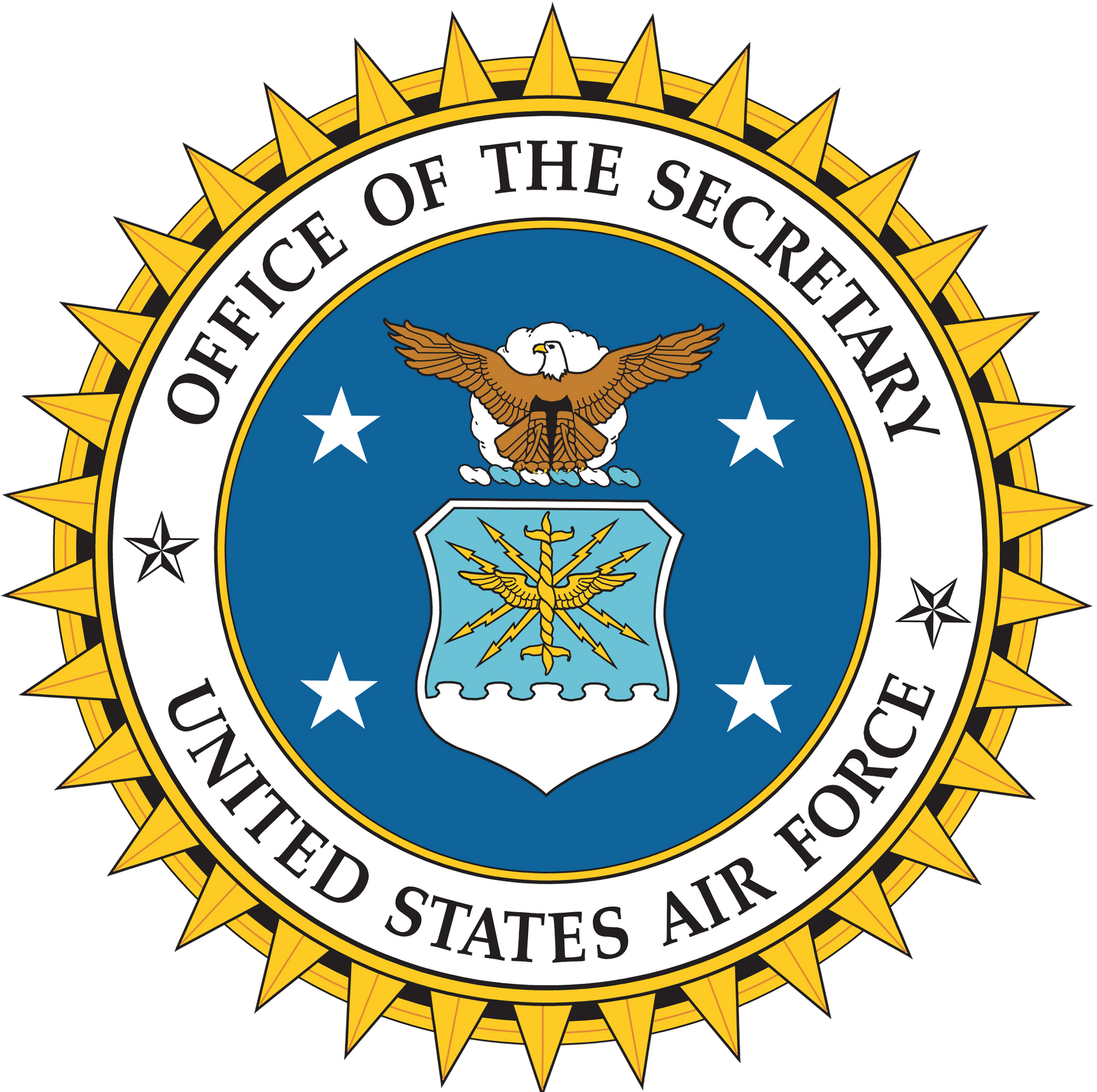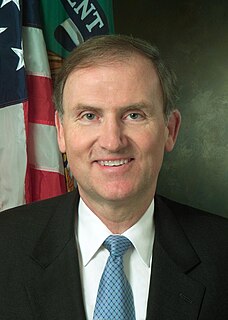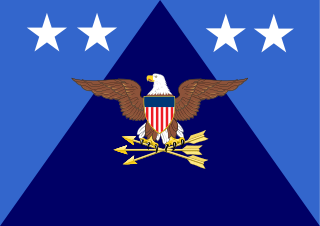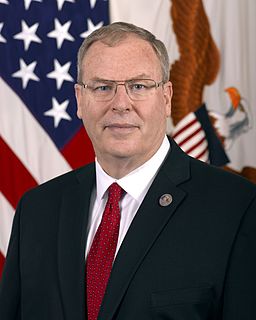Related Research Articles

The White House National Security Council (NSC) is the principal forum used by the President of the United States for consideration of national security, military, and foreign policy matters with senior national security advisors and Cabinet officials and is part of the Executive Office of the President of the United States. Since its inception under Harry S. Truman, the function of the Council has been to advise and assist the President on national security and foreign policies. The Council also serves as the President's principal arm for coordinating these policies among various government agencies. The Council has counterparts in the national security councils of many other nations.

The deputy secretary of defense is a statutory office and the second-highest-ranking official in the Department of Defense of the United States of America.

The Secretary of the Air Force is the head of the Department of the Air Force, a military department within the United States Department of Defense. The Secretary of the Air Force is a civilian appointed by the President, by and with the advice and consent of the Senate. The Secretary reports to the Secretary of Defense and/or the Deputy Secretary of Defense, and is by statute responsible for and has the authority to conduct all the affairs of the Department of the Air Force.

The Department of the Air Force (DAF) is one of the three Military Departments within the Department of Defense of the United States of America. The Department of the Air Force was formed on September 18, 1947, per the National Security Act of 1947 and it includes all elements and units of the United States Air Force (USAF) and the United States Space Force (USSF).

Dov S. Zakheim is an American businessman, writer, politician, and former official of the United States government. In the Reagan administration, he held various Department of Defense positions.

Michèle Angelique Flournoy is the former Under Secretary of Defense for Policy, the seventh-ranking official in the U.S. Department of Defense, and in that role served as a principal advisor to U.S. Secretaries of Defense Robert Gates and Leon Panetta from February 2009 to February 2012. When the U.S. Senate confirmed her nomination on February 9, 2009, she was at the time the highest-ranking woman at the Pentagon in the department's history.

The Defense Science Board (DSB) is a committee of civilian experts appointed to advise the U.S. Department of Defense on scientific and technical matters. It was established in 1956 on the recommendation of the second Hoover Commission.

Robert G. Joseph is a senior scholar at the National Institute for Public Policy and professor at Missouri State University. He was the United States Special Envoy for Nuclear Nonproliferation, with ambassadorial rank. Prior to this post, Joseph was the Under Secretary of State for Arms Control and International Security, a position he held until January 24, 2007. Joseph is known for being instrumental in creating the Proliferation Security Initiative and as the architect of the Global Initiative to Combat Nuclear Terrorism. He was also the US chief negotiator to Libya in 2003 who convinced the Libyans to give up their WMD programs. He also recently authored a book describing his experience in negotiating with Libya entitled "Countering WMD."

The Office of the Secretary of Defense (OSD) is a headquarters-level staff of the United States Department of Defense. It is the principal civilian staff element of the U.S. Secretary of Defense, and it assists the Secretary in carrying out authority, direction and control of the Department of Defense in the exercise of policy development, planning, resource management, fiscal, and program evaluation responsibilities. OSD is the Secretary of Defense’s support staff for managing the Department of Defense, and it corresponds to what the Executive Office of the President of the U.S. is to the U.S. president for managing the whole of the Executive branch of the federal government.

Robert M. Kimmitt was United States Deputy Secretary of the Treasury under President George W. Bush. He was nominated by President Bush on June 29, 2005. The United States Senate unanimously confirmed him on July 29, 2005, and he was sworn into office on August 16, 2005. Kimmitt served through the end of the Bush administration, leaving office on January 20, 2009.
Dawg or DAWG may refer to:
An undersecretary is an executive government official in many countries, frequently a career public servant, who typically acts as a senior administrator or second-in-command to a politically appointed cabinet minister or other government official. The title is used in many different political systems.

The Under Secretary of Defense for Acquisition and Sustainment, or USD(A&S), is a senior civilian official in the Office of the Secretary of Defense within the Department of Defense. USD(A&S) is the principal staff assistant and advisor to the Secretary of Defense and the Deputy Secretary of Defense for all matters concerning Departmental acquisition and sustainment.
The National Science Advisory Board for Biosecurity is a panel of experts that report to the Secretary of the United States Department of Health and Human Services. It is tasked with recommending policies on such questions as how to prevent published research in biotechnology from aiding terrorism, without slowing scientific progress. It is composed of non-voting ex officio and appointed voting members. The current Chair of the NSABB is Samuel L. Stanley, Jr., M.D..

The Under Secretary of Defense (Comptroller)/Chief Financial Officer, abbreviated USD(C)/CFO, is a high level civilian official in the United States Department of Defense. The Under Secretary of Defense (Comptroller) is the principal staff assistant and adviser to both the Secretary of Defense and the Deputy Secretary of Defense for all budgetary and fiscal matters, including the development and execution of the Defense Department's annual budget.

The Army Science Board (ASB) provides advice about army science to senior military leaders. The ASB is a Federal Advisory Committee organized under the Federal Advisory Committee Act. It is the United States Department of the Army senior scientific advisory body that was chartered in 1977 to replace the Army Scientific Advisory Panel. The ASB provides the Army with independent advice and recommendations on matters relating to the Army’s scientific, technological, manufacturing, logistics and business management functions, as well as other matters the Secretary of the Army deems important to the Department of the Army. The Secretary of the Army delegates oversight authority to the Deputy Under Secretary of the Army, who appoints the ASB Executive Director. Terms are generally three years.

Michael Bruce Donley is a former senior United States government official, who served as the 22nd Secretary of the United States Air Force, amongst other positions. Donley has 30 years of experience in the national security community, including service on the staff of the United States Senate, White House and The Pentagon. Donley previously served as the Director of Administration and Management in the Office of the Secretary of Defense.
The Office of the United States Assistant Secretary of the Army for Acquisition, Logistics, and Technology is known as OASA(ALT). OASA(ALT) serves, when delegated, as the Army Acquisition Executive, the Senior Procurement Executive, the Science Advisor to the Secretary of the Army, and as the senior research and development official for the Department of the Army. The OASA(ALT) also has the principal responsibility for all Department of the Army matters related to logistics.

Robert Orton Work is an American national security professional who served as the 32nd United States Deputy Secretary of Defense for both the Obama and Trump administrations from 2014 to 2017. Prior to that, Work was the United States Under Secretary of the Navy from 2009 to 2013, and before that served as a colonel in the United States Marine Corps; Work retired in 2001 and worked as a civilian at the Center for Strategic and Budgetary Assessments (CSBA) and the George Washington University in various positions relating to military and strategic study. From 2013 to 2014, he was the CEO of the Center for a New American Security (CNAS).

James Northey Miller Jr. is a senior fellow at Harvard Kennedy School’s Belfer Center for Science and International Affairs. He was the Under Secretary of Defense for Policy from February 18, 2012 until January 8, 2014. As such, he provided advice to the Secretary of Defense. He was born in Waterloo, Iowa. In 2000, he was awarded the Secretary of Defense Medal for Outstanding Public Service.
References
| This United States military article is a stub. You can help Wikipedia by expanding it. |